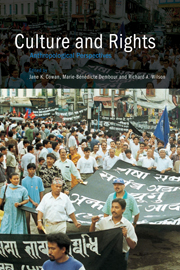Part II - Claiming cultural rights
Published online by Cambridge University Press: 05 June 2012
Summary
The four chapters included in the second part of the book explore how activists involved in grassroots cultural or ethnonationalist movements have been claiming rights based on what they perceive as ‘their culture’. While these local-level case-studies are concerned with realities taking place in various continents – Europe, Southeast Asia, Central America and North America, respectively – they make similar points. One is that the articulation of such claims, which oppose the politically dominant view in the country where they are made, has been directly dependent on an international arena and a global forum which have encouraged their expression, at the same time as local circumstances have shaped the precise form of this articulation. Another point is that the significance and ultimate motive of these claims can only be understood by paying attention to the local context, as moulded by history. Finally, the essentialization of culture is inherent in the making of such claims. Each author, in his or her own way, reveals how such rights processes lead to particular predicaments.
In her study of Macedonian minority claims in Greece, Jane Cowan introduces the concept of ‘minoritization’. With this term, she refers to the transformation of a fluid identity into one of supposedly ontological quality in order to fit legal and political criteria. In the region Cowan has studied, this transformation has been accomplished since the mid-1980s by activists whose words resonate in international fora ready to take on board the activists' message without asking whom they represent.
- Type
- Chapter
- Information
- Culture and RightsAnthropological Perspectives, pp. 149 - 151Publisher: Cambridge University PressPrint publication year: 2001
- 3
- Cited by



